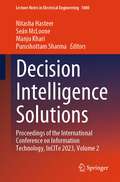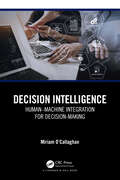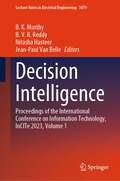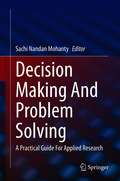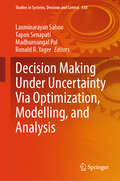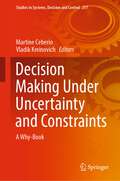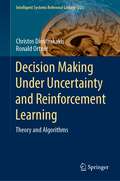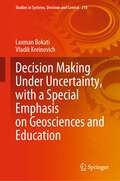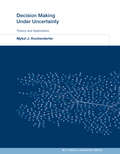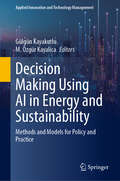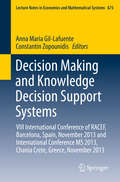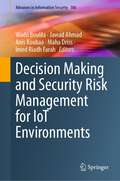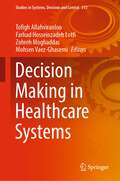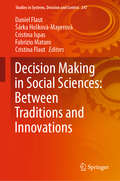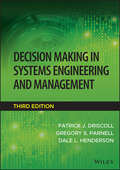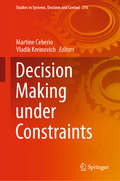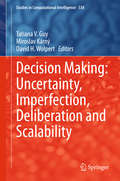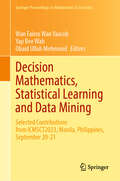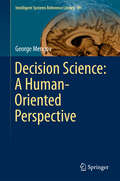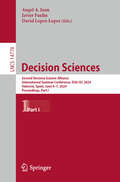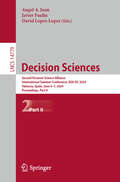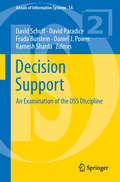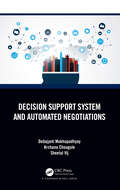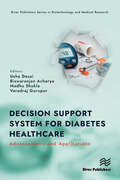- Table View
- List View
Decision Intelligence Solutions: Proceedings of the International Conference on Information Technology, InCITe 2023, Volume 2 (Lecture Notes in Electrical Engineering #1080)
by Manju Khari Seán McLoone Nitasha Hasteer Purushottam SharmaThis book comprises the select peer-reviewed proceedings of the 3rd International Conference on Information Technology (InCITe-2023). It aims to provide a comprehensive and broad-spectrum picture of state-of-the-art research and development in decision intelligence, deep learning, machine learning, artificial intelligence, data science, and enabling technologies for IoT, blockchain, and other futuristic computational technologies. It covers various topics that span cutting-edge, collaborative technologies and areas of computation. The content would serve as a rich knowledge repository on information & communication technologies, neural networks, fuzzy systems, natural language processing, data mining & warehousing, big data analytics, cloud computing, security, social networks and intelligence, decision-making and modeling, information systems, and IT architectures. This book provides a valuable resource for those in academia and industry.
Decision Intelligence: Human–Machine Integration for Decision-Making
by Miriam O'CallaghanRevealing the limitations of human decision-making, this book explores how Artificial Intelligence (AI) can be used to optimize decisions for improved business outcomes and efficiency, as well as looking ahead to the significant contributions Decision Intelligence (DI) can make to society and the ethical challenges it may raise. From the theories and concepts used to design autonomous intelligent agents to the technologies that power DI systems and the ways in which companies use decision-making building blocks to build DI solutions that enable businesses to democratize AI, this book presents an impressive framework to integrate artificial and human intelligence for the success of different types of business decisions. Replete with case studies on DI applications, as well as wider discussions on the social implications of the technology, Decision Intelligence: Human–Machine Integration for Decision Making appeals to both students of AI and data sciences and businesses considering DI adoption.
Decision Intelligence: Proceedings of the International Conference on Information Technology, InCITe 2023, Volume 1 (Lecture Notes in Electrical Engineering #1079)
by B. K. Murthy Nitasha Hasteer Jean-Paul Van Belle B. V. R. ReddyThis book comprises the select peer-reviewed proceedings of the 3rd International Conference on Information Technology (InCITe-2023). It aims to provide a comprehensive and broad-spectrum picture of state-of-the-art research and development in decision intelligence, deep learning, machine learning, artificial intelligence, data science, and enabling technologies for IoT, blockchain, and other futuristic computational technologies. It covers various topics that span cutting-edge, collaborative technologies and areas of computation. The content would serve as a rich knowledge repository on information & communication technologies, neural networks, fuzzy systems, natural language processing, data mining & warehousing, big data analytics, cloud computing, security, social networks, and intelligence, decision-making, and modeling, information systems, and IT architectures. This book provides a valuable resource for those in academia and industry.
Decision Making And Problem Solving: A Practical Guide For Applied Research
by Sachi Nandan MohantyIn Decision Making and Problem Solving: A Practical Guide for Applied Research, the author utilizes traditional approaches, tools, and techniques adopted to solve current day-to-day, real-life problems. The book offers guidance in identifying and applying accurate methods for designing a strategy as well as implementing these strategies in the real world. The book includes realistic case studies and practical approaches that should help readers understand how the decision making occurs and can be applied to problem solving under deep uncertainty.
Decision Making Under Uncertainty Via Optimization, Modelling, and Analysis (Studies in Systems, Decision and Control #558)
by Ronald R. Yager Laxminarayan Sahoo Madhumangal Pal Tapan SenapatiThis book focuses on cutting-edge developments in optimal decision-making incorporating modeling and optimization for determining renewable energy sources, supply chain management, and environmental planning under uncertainty. It addresses mathematical models of cost-effective management policies. This book presents the best decision-making practices for solving real-world challenges. This book provides access to an invaluable collection of various decision-making issues that scholars and industry practitioners use as a reference. The readers are able to understand how decision-making problems are formulated under uncertainty and how to use right optimization strategies to fix problems.
Decision Making Under Uncertainty and Constraints: A Why-Book (Studies in Systems, Decision and Control #217)
by Vladik Kreinovich Martine CeberioThis book shows, on numerous examples, how to make decisions in realistic situations when we have both uncertainty and constraints. In most these situations, the book's emphasis is on the why-question, i.e., on a theoretical explanation for empirical formulas and techniques. Such explanations are important: they help understand why these techniques work well in some cases and not so well in others, and thus, help practitioners decide whether a technique is appropriate for a given situation. Example of applications described in the book ranges from science (biosciences, geosciences, and physics) to electrical and civil engineering, education, psychology and decision making, and religion—and, of course, include computer science, AI (in particular, eXplainable AI), and machine learning. The book can be recommended to researchers and students in these application areas. Many of the examples use general techniques that can be used in other application areas as well, so it is also useful for practitioners and researchers in other areas who are looking for possible theoretical explanations of empirical formulas and techniques.
Decision Making Under Uncertainty and Reinforcement Learning: Theory and Algorithms (Intelligent Systems Reference Library #223)
by Ronald Ortner Christos DimitrakakisThis book presents recent research in decision making under uncertainty, in particular reinforcement learning and learning with expert advice. The core elements of decision theory, Markov decision processes and reinforcement learning have not been previously collected in a concise volume. Our aim with this book was to provide a solid theoretical foundation with elementary proofs of the most important theorems in the field, all collected in one place, and not typically found in introductory textbooks. This book is addressed to graduate students that are interested in statistical decision making under uncertainty and the foundations of reinforcement learning.
Decision Making Under Uncertainty, with a Special Emphasis on Geosciences and Education (Studies in Systems, Decision and Control #218)
by Vladik Kreinovich Laxman BokatiThis book describes new techniques for making decisions in situations with uncertainty and new applications of decision-making techniques. The main emphasis is on situations when it is difficult to decrease uncertainty. For example, it is very difficult to accurately predict human economic behavior, so in economics, it is very important to take this uncertainty into account when making decisions. Other areas where it is difficult to decrease uncertainty are geosciences and teaching. The book analyzes the general problem of decision making and shows how its results can be applied to economics, geosciences, and teaching. Since all these applications involve computing, the book also shows how these results can be applied to computing, including deep learning and quantum computing. The book is recommended to researchers, practitioners, and students who want to learn more about decision making under uncertainty—and who want to work on remaining challenges.
Decision Making Under Uncertainty: Theory and Application (MIT Lincoln Laboratory Series)
by Mykel J. KochenderferAn introduction to decision making under uncertainty from a computational perspective, covering both theory and applications ranging from speech recognition to airborne collision avoidance.Many important problems involve decision making under uncertainty—that is, choosing actions based on often imperfect observations, with unknown outcomes. Designers of automated decision support systems must take into account the various sources of uncertainty while balancing the multiple objectives of the system. This book provides an introduction to the challenges of decision making under uncertainty from a computational perspective. It presents both the theory behind decision making models and algorithms and a collection of example applications that range from speech recognition to aircraft collision avoidance.Focusing on two methods for designing decision agents, planning and reinforcement learning, the book covers probabilistic models, introducing Bayesian networks as a graphical model that captures probabilistic relationships between variables; utility theory as a framework for understanding optimal decision making under uncertainty; Markov decision processes as a method for modeling sequential problems; model uncertainty; state uncertainty; and cooperative decision making involving multiple interacting agents. A series of applications shows how the theoretical concepts can be applied to systems for attribute-based person search, speech applications, collision avoidance, and unmanned aircraft persistent surveillance.Decision Making Under Uncertainty unifies research from different communities using consistent notation, and is accessible to students and researchers across engineering disciplines who have some prior exposure to probability theory and calculus. It can be used as a text for advanced undergraduate and graduate students in fields including computer science, aerospace and electrical engineering, and management science. It will also be a valuable professional reference for researchers in a variety of disciplines.
Decision Making Using AI in Energy and Sustainability: Methods and Models for Policy and Practice (Applied Innovation and Technology Management)
by Gülgün Kayakutlu M. Özgür KayalicaArtificial intelligence (AI) has a huge impact on science and technology, including energy, where access to resources has been a source of geopolitical conflicts. AI can predict the demand and supply of renewable energy, optimize efficiency in energy systems, and improve the management of natural energy resources, among other things. This book explores the use of AI tools for improving the management of energy systems and providing sustainability with smart cities, smart facilities, smart buildings, smart transportation, and smart houses. Featuring research from International Federation for Information Processing's (IFIP) “AI in Energy and Sustainability” working group, this book provides new models and algorithms for AI applications in energy and sustainability fields. Any short-term, mid-term and long-term forecasting, optimization models, trend foresights and prescriptions based on scenarios are studied in the energy world and the smart systems for sustainability. The contents of this book are valuable for energy researchers, academics, scholars, practitioners and policy makers.
Decision Making and Decision Support in the Information Era: Dedicated to Academician Florin Filip (Studies in Systems, Decision and Control #534)
by Janusz Kacprzyk Valentina Emilia Balas Gintautas Dzemyda Smaranda BelciugThis book is a comprehensive and full-fledged presentation of how modern algorithmic tools and techniques with software implementations can provide an effective and efficient solution of a multitude of problems faced in real life. These problems range from all kinds of data analyses, medical data analyses, image analyses and recognitions, support of medical diagnoses, etc. to new concepts of smart towns and other environments. Emphasis will be on the role of intelligent systems and artificial intelligence and a synergistic collaboration between human beings and computer systems. Modern decision support systems are a main focus point.
Decision Making and Knowledge Decision Support Systems
by Constantin Zopounidis Anna Maria Gil-LafuenteThis book presents recent advancements of research, new methods and techniques, applications and projects in decision making and decision support systems. It explores expert systems and neural networks, knowledge engineering and management, fuzzy sets and systems and computational methods for optimization, data analysis and decision making. It presents applications in Economics, Finance, Management and Engineering. The book undertakes to stimulate scientific exchange, ideas and experiences in the field of decision making in Economy and Management. Researchers and practitioners alike will benefit from this book, when they are dealing with imprecision, vagueness and uncertainty in the context of decision making.
Decision Making and Security Risk Management for IoT Environments (Advances in Information Security #106)
by Jawad Ahmad Anis Koubaa Wadii Boulila Maha Driss Imed Riadh FarahThis book contains contemporary research that outlines and addresses security, privacy challenges and decision-making in IoT environments. The authors provide a variety of subjects related to the following Keywords: IoT, security, AI, deep learning, federated learning, intrusion detection systems, and distributed computing paradigms. This book also offers a collection of the most up-to-date research, providing a complete overview of security and privacy-preserving in IoT environments. It introduces new approaches based on machine learning that tackles security challenges and provides the field with new research material that’s not covered in the primary literature. The Internet of Things (IoT) refers to a network of tiny devices linked to the Internet or other communication networks. IoT is gaining popularity, because it opens up new possibilities for developing many modern applications. This would include smart cities, smart agriculture, innovative healthcare services and more. The worldwide IoT market surpassed $100 billion in sales for the first time in 2017, and forecasts show that this number might reach $1.6 trillion by 2025. However, as IoT devices grow more widespread, threats, privacy and security concerns are growing. The massive volume of data exchanged highlights significant challenges to preserving individual privacy and securing shared data. Therefore, securing the IoT environment becomes difficult for research and industry stakeholders.Researchers, graduate students and educators in the fields of computer science, cybersecurity, distributed systems and artificial intelligence will want to purchase this book. It will also be a valuable companion for users and developers interested in decision-making and security risk management in IoT environments.
Decision Making in Healthcare Systems (Studies in Systems, Decision and Control #513)
by Tofigh Allahviranloo Mohsen Vaez-Ghasemi Zohreh Moghaddas Farhad Hosseinzadeh LotfiThis book chooses the topic which is due to the editors' experience in modeling projects in healthcare systems. Also, the transfer of experiences is the reason why mathematical modeling and decision making in the field of health are not given much attention. To this end, the new aspect of this book is the lack of reference needed to carry out projects in the field of health for researchers whose main expertise is not modeling. Students of health, mathematics, management, and industrial engineering fields are in the direct readership with this book. Different projects in the field of healthcare systems can use the topics presented in different chapters mentioned in this book.
Decision Making in Social Sciences: Between Traditions and Innovations (Studies in Systems, Decision and Control #247)
by Šárka Hošková-Mayerová Fabrizio Maturo Cristina Flaut Daniel Flaut Cristina IspasThis book explores several branches of the social sciences and their perspectives regarding their relations with decision-making processes: computer science, education, linguistics, sociology, and management. The decision-making process in social contexts is based on the analysis of sound alternatives using evaluative criteria. Therefore, this process is one that can be rational or irrational, and can be based on knowledge and/or beliefs. A decision-making process always produces a final decision, which may or may not imply prompt action, and increases the chances of choosing the best possible alternative. The book is divided into four main parts. The concepts covered in the first part, on computer science, explore how the rise of algorithms and the growth in computing power over the years can influence decision-making processes. In the second part, some traditional and innovative ideas and methods used in education are presented: compulsory schooling, inclusive schools, higher education, etc. In turn, the third part focuses on linguistics aspects, and examines how progress is manifested in language. The fourth part, on sociology, explores how society can be influenced by social norms, human interactions, culture, and religion. Management, regarded as a science of the decision-making process, is explored in the last part of this book. Selected organizations’ strategies, objectives and resources are presented, e.g., human resources, financial resources, and technological resources. The book gathers and presents, in a concise format, a broad range of aspects regarding the decision-making process in social contexts, making it a valuable and unique resource for the scientific community.
Decision Making in Systems Engineering and Management (Wiley Series In Systems Engineering And Management Ser. #79)
by Patrick J DriscollDECISION MAKING IN SYSTEMS ENGINEERING AND MANAGEMENT A thoroughly updated overview of systems engineering management and decision making In the newly revised third edition of Decision Making in Systems Engineering and Management, the authors deliver a comprehensive and authoritative overview of the systems decision process, systems thinking, and qualitative and quantitative multi-criteria value modeling directly supporting decision making throughout the system lifecycle. This book offers readers major new updates that cover recently developed system modeling and analysis techniques and quantitative and qualitative approaches in the field, including effective techniques for addressing uncertainty. In addition to Excel, six new open-source software applications have been added to illustrate key topics, including SIPmath Modeler Tools, Cambridge Advanced Modeller, SystemiTool2.0, and Gephi 0.9.2. The authors have reshaped the book’s organization and presentation to better support educators engaged in remote learning. New appendices have been added to present extensions for a new realization analysis technique and getting started steps for each of the major software applications. Updated illustrative examples support modern system decision making skills and highlight applications in hardware, organizations, policy, logistic supply chains, and architecture. Readers will also find: Thorough introductions to working with systems, the systems engineering perspective, and systems thinking In-depth presentations of applied systems thinking, including holism, element dependencies, expansive and contractive thinking, and concepts of structure, classification, and boundaries Comprehensive explorations of system representations leading to analysis In-depth discussions of supporting system decisions, including the system decision process (SDP), tradespace methods, multi-criteria value modeling, working with stakeholders, and the system environment Perfect for undergraduate and graduate students studying systems engineering and systems engineering management, Decision Making in Systems Engineering and Management will also earn a place in the libraries of practicing system engineers and researchers with an interest in the topic.
Decision Making under Constraints (Studies in Systems, Decision and Control #276)
by Vladik Kreinovich Martine CeberioThis book presents extended versions of selected papers from the annual International Workshops on Constraint Programming and Decision Making from 2016 to 2018. The papers address all stages of decision-making under constraints: (1) precisely formulating the problem of multi-criteria decision-making; (2) determining when the corresponding decision problem is algorithmically solvable; (3) finding the corresponding algorithms and making these algorithms as efficient as possible; and (4) taking into account interval, probabilistic, and fuzzy uncertainty inherent in the corresponding decision-making problems. In many application areas, it is necessary to make effective decisions under constraints, and there are several area-specific techniques for such decision problems. However, because they are area-specific, it is not easy to apply these techniques in other application areas. As such, the annual International Workshops on Constraint Programming and Decision Making focus on cross-fertilization between different areas, attracting researchers and practitioners from around the globe. The book includes numerous papers describing applications, in particular, applications to engineering, such as control of unmanned aerial vehicles, and vehicle protection against improvised explosion devices.
Decision Making: Uncertainty, Imperfection, Deliberation and Scalability
by Tatiana V. Guy Miroslav Kárný David H. WolpertThis volume focuses on uncovering the fundamental forces underlying dynamic decision making among multiple interacting, imperfect and selsh decision makers. The chapters are written by leading experts from different disciplines, all considering the many sources of imperfection in decision making, and always with an eye to decreasing the myriad discrepancies between theory and real world human decision making. Topics addressed include uncertainty, deliberation cost and the complexity arising from the inherent large computational scale of decision making in these systems. In particular, analyses and experiments are presented which concern: * task allocation to maximize "the wisdom of the crowd"; * design of a society of "edutainment" robots who account for one anothers' emotional states; * recognizing and counteracting seemingly non-rational human decision making; * coping with extreme scale when learning causality in networks; * efciently incorporating expert knowledge in personalized medicine; * the effects of personality on risky decision making. The volume is a valuable source for researchers, graduate students and practitioners in machine learning, stochastic control, robotics, and economics, among other elds.
Decision Mathematics, Statistical Learning and Data Mining: Selected Contributions from ICMSCT2023, Manila, Philippines, September 20-21 (Springer Proceedings in Mathematics & Statistics #461)
by Yap Bee Wah Wan Fairos Wan Yaacob Obaid Ullah MehmoodThis book is a collection of selected research papers presented at the Mathematics, Statistics and Computing Technology (ICMSCT2023), held at the UST Angelicum College, Philippines, from 20th to 21st September 2023. This biennial event is a result from collaborations of university partners in Malaysia, Thailand, Indonesia and Philippines. Increasing investment in digital technologies is a challenge faced by most countries after the crisis caused by COVID-19 and the demand of technological revolution 4.0. Indirectly, regardless of their level of development, they take into account the importance of redesigning strategies for resilient and sustainable regional economic development, increasing regional resilience and minimizing recovery costs as a basis for development. In such situation, this book gather discussion, viewpoints and findings on the recent works of mathematical and computing technology applications in order to propose solutions to overcome adversity of digital resilience. This book covers a wide range of topics on applied mathematics, which includes decision mathematics and also applied statistics covering statistical learning with applications. In addition, the book also highlight the latest application of statistical mining and data visualization, particularly on data mining, machine learning and data visualization. Editors believe this book will interest and influence researchers on the recent techniques, methodologies and applications to ensure digital resilience and support future research.
Decision Science: A Human-Oriented Perspective
by George MengovThis book offers a new perspective on human decision-making by comparing the established methods in decision science with innovative modelling at the level of neurons and neural interactions. The book presents a new generation of computer models, which can predict with astonishing accuracy individual economic choices when people make them by quick intuition rather than by effort. A vision for a new kind of social science is outlined, whereby neural models of emotion and cognition capture the dynamics of socioeconomic systems and virtual social networks. The exposition is approachable by experts as well as by advanced students. The author is an Associate Professor of Decision Science with a doctorate in Computational Neuroscience, and a former software consultant to banks in the City of London.
Decision Sciences: Second Decision Science Alliance International Summer Conference, DSA ISC 2024, Valencia, Spain, June 6–7, 2024, Proceedings, Part I (Lecture Notes in Computer Science #14778)
by Javier Faulin Angel A. Juan David Lopez-LopezThis book constitutes the proceedings of the Second Decision Science Alliance International Summer Conference, DSA ISC 2024, held in Valencia, Spain, in June 2024. The 33 full papers and 38 short papers included in this book were carefully reviewed and selected from 101 submissions. At the core of DSA ISC’24 are in-depth discussions and analyses across a spectrum of technological domains. Notably, experts shared their knowledge on areas such as Artificial Intelligence & Machine Learning, Mathematical Optimization, Operational Research & Management Science, Statistics, Simulation, and Decision Processes Analysis. Each of these areas represents a key aspect of decision science, contributing to the interdisciplinary nature of the conference.
Decision Sciences: Second Decision Science Alliance International Summer Conference, DSA ISC 2024, Valencia, Spain, June 6–7, 2024, Proceedings, Part II (Lecture Notes in Computer Science #14779)
by Javier Faulin Angel A. Juan David Lopez-LopezThis book constitutes the proceedings of the Second Decision Science Alliance International Summer Conference, DSA ISC 2024, held in Valencia, Spain, in June 2024. The 33 full papers and 38 short papers included in this book were carefully reviewed and selected from 101 submissions. At the core of DSA ISC’24 are in-depth discussions and analyses across a spectrum of technological domains. Notably, experts shared their knowledge on areas such as Artificial Intelligence & Machine Learning, Mathematical Optimization, Operational Research & Management Science, Statistics, Simulation, and Decision Processes Analysis. Each of these areas represents a key aspect of decision science, contributing to the interdisciplinary nature of the conference.
Decision Support
by David Paradice Ramesh Sharda Daniel J. Power David Schuff Frada BursteinThis volume of Annals of Information Systems will acknowledge the twentieth anniversary of the founding of the International Society for Decision Support Systems (ISDSS) by documenting some of the current best practices in teaching and research and envisioning the next twenty years in the decision support systems field. The volume is intended to complement existing DSS literature by offering an outlet for thoughts and research particularly suited to the theme of describing the next twenty years in the area of decision support. Several subthemes are planned for the volume. One subtheme draws on the assessments of internationally known DSS researchers to evaluate where the field has been and what has been accomplished. A second subtheme of the volume will be describing the current best practices of DSS research and teaching efforts. A third subtheme will be an assessment by top DSS scholars on where the DSS discipline needs to focus in the future. The tone of this volume is one of enthusiasm for the potential contributions to come in the area of DSS; contributions that must incorporate an understanding of what has been accomplished in the past, build on the best practices of today, and be be integrated into future decision making practices. The primary questions raised by this volume are: What will information systems-based decision support entail in twenty years? What research is needed to realize the envisioned future of information systems-based decision support? How will the teaching of information systems-based decision support change over the next twenty years? What are the best practices of teaching in the decision support area that can be leveraged to best disseminate DSS knowledge advances to students and practitioners?
Decision Support System and Automated Negotiations
by Debajyoti Mukhopadhyay Archana Chougule Sheetal VijDecision support systems are developed for integrated pest and disease management and nutrition management using open-source technologies as java, android, and low-cost hardware devices like Arduino micro controller. This text discusses the techniques to convert agricultural knowledge in the context of ontology and assist grape growers by providing this knowledge through decision support system. The key features of the book are: Presents the design & development of an ontology-based decision support system for integrated crop management. Discusses the techniques to convert agricultural knowledge in text to ontology. Focuses on an extensive study of various e-Negotiation protocols for automated negotiations Provides an architecture for predicting the opponent’s behaviour and various factors which affect the process of negotiation. The text is primarily written for graduate students, professionals, and academic researchers working in the fields of computer science and engineering, agricultural science, and information technology.
Decision Support System for Diabetes Healthcare: Advancements and Applications (River Publishers Series in Biotechnology and Medical Research)
by Varadraj Gurupur Biswaranjan Acharya Usha Desai Madhu ShuklaDecision Support System for Diabetes Healthcare: Advancements and Applications is a comprehensive guide to the cutting-edge technology transforming diabetes management. In this book, leading experts in the field explore how decision support systems (DSS) are revolutionizing healthcare practices, particularly in diabetes care. From advanced data analytics to personalized treatment recommendations, this book delves into the innovative solutions that are reshaping how healthcare providers approach diabetes management. Readers will gain insights into the latest developments in DSS technology, including predictive modeling, machine learning algorithms, and real-time monitoring systems, all designed to enhance patient outcomes and improve quality of life. With a focus on practical applications, Decision Support System for Diabetes Healthcare offers case studies and examples of successful DSS implementations across various healthcare settings. Whether you're a healthcare professional, researcher, or technology enthusiast, this book provides invaluable insights into the future of diabetes care. By exploring the intersection of technology and healthcare, readers will discover how DSS is empowering both patients and providers to make informed decisions, optimize treatment plans, and ultimately, transform the way diabetes is managed on a global scale.
